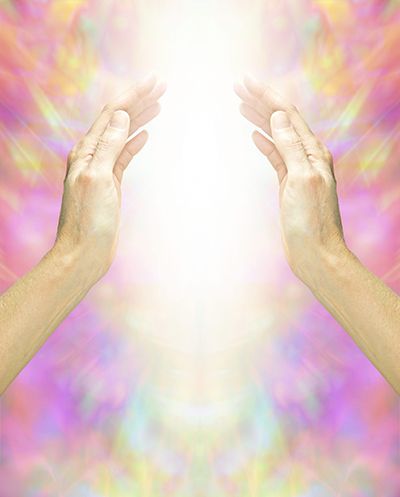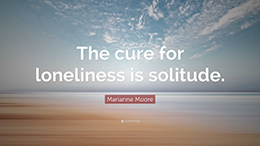Inner approach to health
Embrace Your Loneliness
“Our souls can visit in great lonely hours Still regions of imperishable Light…. (2)”
Abstract
We are never really alone. The sense of isolation is only an illusion. To address this malaise, our human love needs to translate into a love that exists just for the sake of loving. To be conscious of the Divine Presence is the only panacea. Aspiration is essential. The author describes a simple practice to help make this shift.
Loneliness is a perplexing and painful state in which to find oneself. It can be very distressing to live without the companionship and support of our fellow human beings. To lose a ‘soul mate’ would be even more unbearable if one didn’t recognise the immortal spirit behind everything and everyone. Acknowledging this truth is the first step out of this condition.
Loneliness is an illusory state because we are all innately divine and one with everything. We may be alone but we are never really alone. If you experience loneliness, you are standing on a bridge between two worlds: one of lack, the other of plenitude. The lack creates a vacuum which will be filled to overflowing if one adopts a true and conscious approach. Because of this, loneliness, in many ways, can often offer an ideal platform for the spiritual life. The emptiness has to be filled somehow. What else can assuage this aching sadness than to have the Divine permanently lodged inside our hearts? This is the only true cure. The truth is, the Divine is always there but we are not conscious.
‘Alone-time’, in today’s world, is generally regarded as something to be avoided. It is quite radical to consider it as an opportunity. It takes a great deal of strength and a measure of integrality to expand and grow in one’s own solitary atmosphere. One needs to be centred and intact, not to regress.
When we find ourselves alone, we sometimes search for props. Generally, these episodes are not used wisely. We tend to indulge our senses. We might drink or eat too much. We interact on social media and generate virtual relationships in an attempt to blot out the void. As a reflex, we switch on the television in order to produce new images and noises. Any distraction is viewed as company: anything to prevent the nightmare of being on one’s own. Anything but this silence! Anything to remove the isolation! The prospect and reality of foregoing these accessories is considered unbearable. However, they only deaden us inside and slowly deepen the pit in which we live.
The Yearning for Company
A yearning for human company is embedded in us from the moment we are born. This single experience captures us for life. Then, gradually, we become embedded in the social fabric and become magnets for all kinds of conditionings, so much so, that we might even interpret our alone-time as a result of inferiority. Heeding the herd mentality is what we have to swim against. The isolation might lead to further morbidities and leave a lingering sense of self-pity. We have to continuously step back and disengage from the continual flux in order to discover our Inner Friend and this is when we begin to expand and grow.
But this conditioning is deeply ingrained in us. It helps to observe this phenomenon closely if it ever comes to visit you. It happened that I ‘caught’ this vibration quite tangibly this morning as I said goodbye to my family who were leaving to work in town, a good distance from where we live. There was a momentary and instantaneous intrusion of emptiness and trepidation when this happened. A long day lay ahead and something in me suddenly baulked at the prospect. The observation made a true difference. It somehow defused the automatic reaction. One tiny spot of consciousness can have this effect. One morsel of knowledge can resolve any problem. Every human condition can ultimately be processed if one is attentive, surrendering and conscious. We just need to be awake and watch ourselves.
Actually, I find my most dolorous moments of loneliness have occurred when I am not on my own. It used to come, and still occasionally does, when I am in the company of people I just don’t resonate with. There might be a mutual lack of affection, not even flicker of acknowledgment. The relationship might have outlived its purpose and reached a dead-end. Without any mutual recognition comes isolation; it reflects and reinforces the void that’s exists inside. Everything seems so hollow when one feels trapped like this. It really scars the ego!
Because of this, one might feel the greatest sense of loneliness when one is in a crowd. Imagine you are in a large conference hall, amid throngs of people, all with their own agendas. You feel lost as your eyes desperately search for other eyes which might offer the faintest flicker of response or warmth.
When one starts to grow in consciousness, one gets very sensitive to any surrounding sense of suffocation. When one finds oneself living amid mundane society or company, a loneliness will invariably appear. This happens because one is identifying with the illusion and not the rich resources that lie inside. To be honest, it seems very real! From my experience, whenever I go to the West, I face this prospect of isolation. The focus always needs to be adjusted and shifted. We need to fix ourselves always on the Truth.
In Integral Yoga, any such difficulty must be viewed as an opportunity for growth. Everything has to be processed and offered to the Light. All our attachments have to be traversed and transformed. We learn a simple truth: do not expect anything from anyone. If you do, you are sure to wind up hurt. Dependence and attachment will only fester loneliness The cause of loneliness is the tendency to drift to the surface away from one’s ‘true home’. We can only truly rely on what lies deep inside. The surface consciousness does not have the capacity to process these alone states. They only make the ego shrink.
Outer and Inner Loneliness
There is an outer loneliness and an inner loneliness. With the outer condition, one has to constantly erect scaffolding to keep one’s life from falling apart. It is all the ego can manage. This is a domain of makeshift responses and piecemeal solutions. It is a condition of the common man. It requires a radical intervention or catastrophe to truly heal this affliction because it is only a reversal of awareness that will completely work.
Inner loneliness is much direr. It might be precipitated by intense grieving, bereavement or loss. The being craves to recapture some affection and love. The past is often idealised and there is an aching chasm inside the heart. Very often though, we feel an intense ache and we don’t know why. There is really only one remedy:
“The inner loneliness can only be cured by the inner experience of union with the Divine; no human association can fill the void (3).”
The intense emptiness of this state can lead to a hidden yearning for divine unification. Here, the Mother replies to a remark from a young practitioner:
“There are moments when one feels a kind of emptiness within; one is dejected and lonely — it is because one wants to be loved.”
“Or better, it is because one is awaking to the need of knowing one’s soul and uniting with the Divine (4).”
Loneliness is always a factor of misplaced identification. It is only when the identity shifts to the Divine that the illusion recedes. Only by aligning and refining it, will the sense of well-being be restored. We need to climb the rungs of the ladder to shift from our very human love to love solely for the sake of loving. Try Drop the need to be loved and become the personification of love itself. Work on making your love more disinterested:
“You feel lonely because you feel the need to be loved. Learn to love without demand, to love just for the joy of loving (the most wonderful joy in the world!) and you will never again feel lonely. (5).”
Most of all, realise that you are not abandoned:
“Never forget that you are not alone. The Divine is with you helping and guiding you. He is the companion who never fails, the friend whose love comforts and strengthens. The more you feel lonely, the more you are ready to perceive His luminous Presence. Have faith and He will do everything for you (6).”
Sincere aspiration is required to rectify the imbalance. Only in this state, can one build a practice and fill this aching void. Practice becomes the extension of our aspiration.
Try working with the breath and calling the Mother’s name at the same time. Become truly conscious of the breath. See where it comes from and observe its quality. Experience the breath rising and falling. Feel the gaps and dive into them. The Presence is also there. Don’t try to change it; just breathe. Be present with it. Allow the breath to ground you and keep you in the ‘now’. If your attention lapses, patiently go back and start again.
Simultaneously, we invoke the Grace of the Divine Mother. With every in-breath we can connect with Her by inwardly invoking her name. With every out-breath too, we follow the same procedure. The practice accumulates over a period of time and develops its own unique and singular rhythm. With continuity, the name will start to automatically repeat itself. Embrace and allow it to become an intrinsic part of your consciousness. Sincere practice will ensure a continuous flow of aspiration. But you have to see it to the very end! This simple approach provides a common thread to keep her Presence always alive. We can be with Her always. Once truly conscious of Her, we realise that She alone is all we truly need. As our love deepens, human substitutes lose significance. Whatever practice we adopt, never lose this aspiration. Embrace your loneliness, open to her Love and watch it gradually transform into rapture!
References
1. The Mother. Mother’s Agenda, Volume 7. Paris: Institut de Recherches Évolutives ; 1991 [English transl.], p. 62.
2. Sri Aurobindo. The Complete Works of Sri Aurobindo, Volume 33. Pondicherry Sri Aurobindo Ashram Trust; 1997, p. 47.
3. Sri Aurobindo. Complete Works, Volume 31; 2014, p. 310.
4. The Mother. The Collected Works of the Mother, Volume 16. 2nd ed. Pondicherry: Sri Aurobindo Ashram Trust; 2003, p. 281.
5. The Mother. Collected Works, Volume 14; 2003, p. 121.
6. Ibid., p. 9.
James Anderson is a member of SAIIIHR and coordinating editor of NAMAH.
Share with us (Comments,contributions,opinions)
When reproducing this feature, please credit NAMAH,and give the byline. Please send us cuttings.






